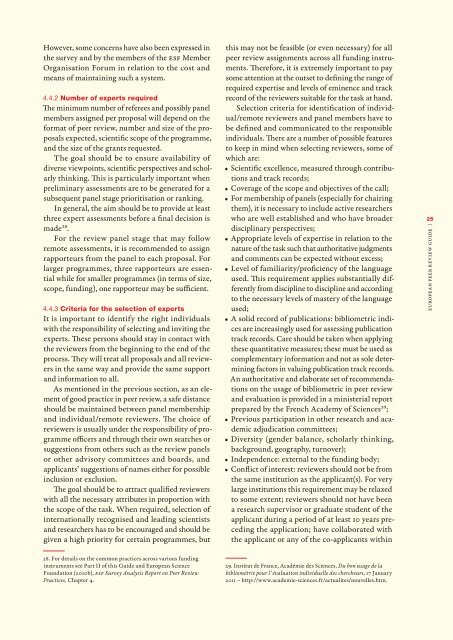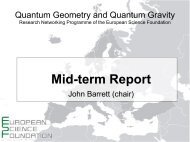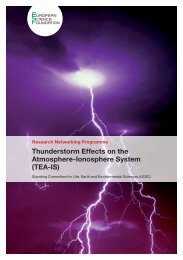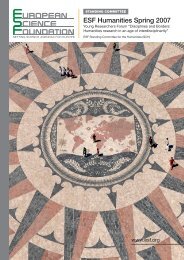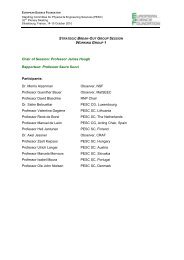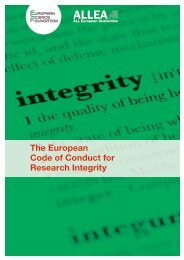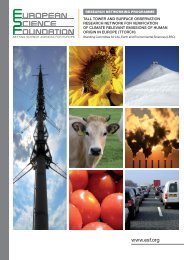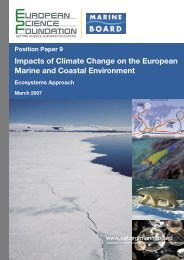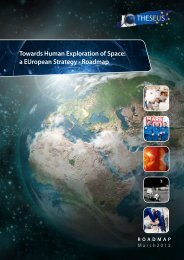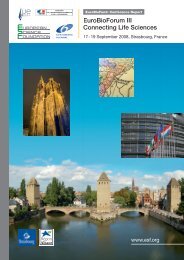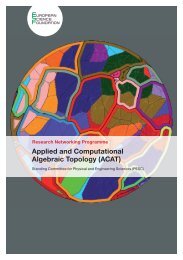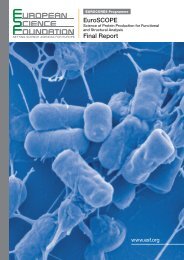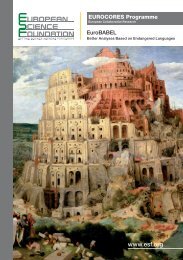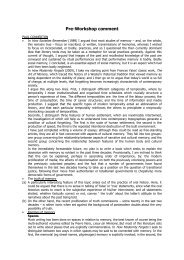European Peer Review Guide - European Science Foundation
European Peer Review Guide - European Science Foundation
European Peer Review Guide - European Science Foundation
You also want an ePaper? Increase the reach of your titles
YUMPU automatically turns print PDFs into web optimized ePapers that Google loves.
However, some concerns have also been expressed in<br />
the survey and by the members of the ESF Member<br />
Organisation Forum in relation to the cost and<br />
means of maintaining such a system.<br />
4.4.2 Number of experts required<br />
The minimum number of referees and possibly panel<br />
members assigned per proposal will depend on the<br />
format of peer review, number and size of the proposals<br />
expected, scientific scope of the programme,<br />
and the size of the grants requested.<br />
The goal should be to ensure availability of<br />
diverse viewpoints, scientific perspectives and scholarly<br />
thinking. This is particularly important when<br />
preliminary assessments are to be generated for a<br />
subsequent panel stage prioritisation or ranking.<br />
In general, the aim should be to provide at least<br />
three expert assessments before a final decision is<br />
made28.<br />
For the review panel stage that may follow<br />
remote assessments, it is recommended to assign<br />
rapporteurs from the panel to each proposal. For<br />
larger programmes, three rapporteurs are essential<br />
while for smaller programmes (in terms of size,<br />
scope, funding), one rapporteur may be sufficient.<br />
4.4.3 Criteria for the selection of experts<br />
It is important to identify the right individuals<br />
with the responsibility of selecting and inviting the<br />
experts. These persons should stay in contact with<br />
the reviewers from the beginning to the end of the<br />
process. They will treat all proposals and all reviewers<br />
in the same way and provide the same support<br />
and information to all.<br />
As mentioned in the previous section, as an element<br />
of good practice in peer review, a safe distance<br />
should be maintained between panel membership<br />
and individual/remote reviewers. The choice of<br />
reviewers is usually under the responsibility of programme<br />
officers and through their own searches or<br />
suggestions from others such as the review panels<br />
or other advisory committees and boards, and<br />
applicants’ suggestions of names either for possible<br />
inclusion or exclusion.<br />
The goal should be to attract qualified reviewers<br />
with all the necessary attributes in proportion with<br />
the scope of the task. When required, selection of<br />
internationally recognised and leading scientists<br />
and researchers has to be encouraged and should be<br />
given a high priority for certain programmes, but<br />
this may not be feasible (or even necessary) for all<br />
peer review assignments across all funding instruments.<br />
Therefore, it is extremely important to pay<br />
some attention at the outset to defining the range of<br />
required expertise and levels of eminence and track<br />
record of the reviewers suitable for the task at hand.<br />
Selection criteria for identification of individual/remote<br />
reviewers and panel members have to<br />
be defined and communicated to the responsible<br />
individuals. There are a number of possible features<br />
to keep in mind when selecting reviewers, some of<br />
which are:<br />
• Scientific excellence, measured through contributions<br />
and track records;<br />
• Coverage of the scope and objectives of the call;<br />
• For membership of panels (especially for chairing<br />
them), it is necessary to include active researchers<br />
who are well established and who have broader<br />
disciplinary perspectives;<br />
• Appropriate levels of expertise in relation to the<br />
nature of the task such that authoritative judgments<br />
and comments can be expected without excess;<br />
• Level of familiarity/proficiency of the language<br />
used. This requirement applies substantially differently<br />
from discipline to discipline and according<br />
to the necessary levels of mastery of the language<br />
used;<br />
• A solid record of publications: bibliometric indices<br />
are increasingly used for assessing publication<br />
track records. Care should be taken when applying<br />
these quantitative measures; these must be used as<br />
complementary information and not as sole determining<br />
factors in valuing publication track records.<br />
An authoritative and elaborate set of recommendations<br />
on the usage of bibliometric in peer review<br />
and evaluation is provided in a ministerial report<br />
prepared by the French Academy of <strong>Science</strong>s29;<br />
• Previous participation in other research and academic<br />
adjudication committees;<br />
• Diversity (gender balance, scholarly thinking,<br />
background, geography, turnover);<br />
• Independence: external to the funding body;<br />
• Conflict of interest: reviewers should not be from<br />
the same institution as the applicant(s). For very<br />
large institutions this requirement may be relaxed<br />
to some extent; reviewers should not have been<br />
a research supervisor or graduate student of the<br />
applicant during a period of at least 10 years preceding<br />
the application; have collaborated with<br />
the applicant or any of the co-applicants within<br />
25<br />
<strong>European</strong> <strong>Peer</strong> <strong>Review</strong> <strong>Guide</strong><br />
28. For details on the common practices across various funding<br />
instruments see Part II of this <strong>Guide</strong> and <strong>European</strong> <strong>Science</strong><br />
<strong>Foundation</strong> (2010b), ESF Survey Analysis Report on <strong>Peer</strong> <strong>Review</strong><br />
Practices, Chapter 4.<br />
29. Institut de France, Académie des <strong>Science</strong>s, Du bon usage de la<br />
bibliométrie pour l’évaluation individuelle des chercheurs, 17 January<br />
2011 – http://www.academie-sciences.fr/actualites/nouvelles.htm.


